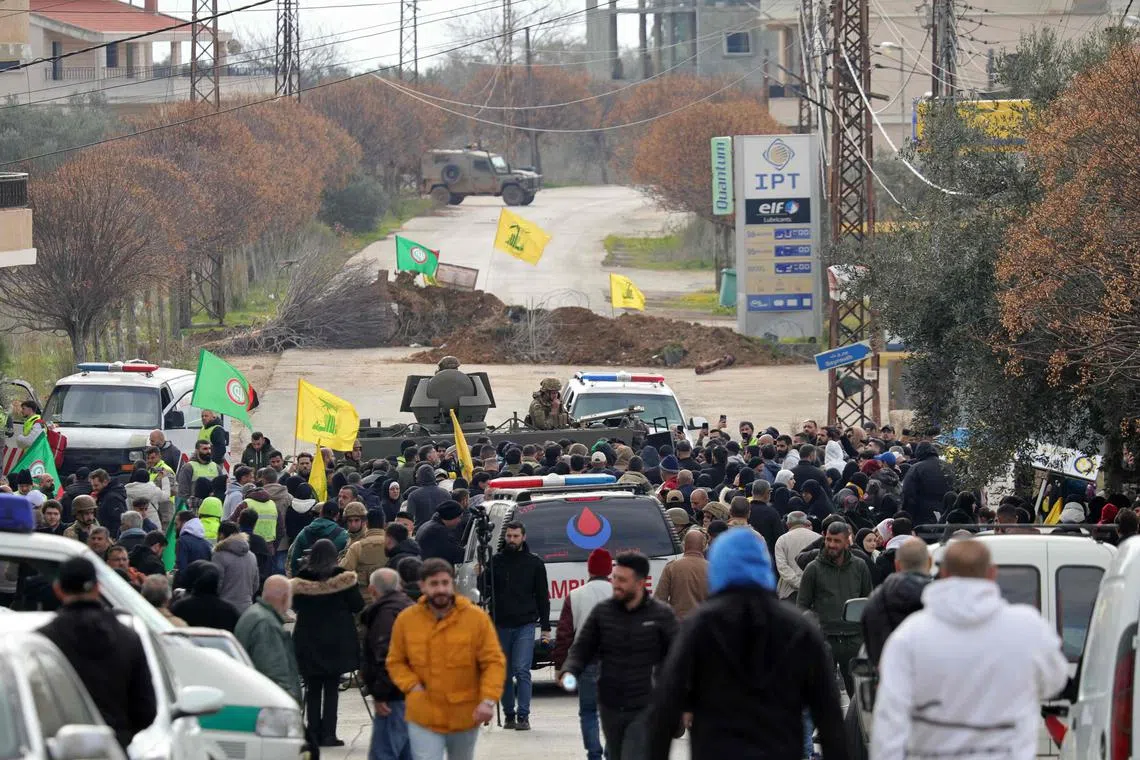Israeli forces kill 22 people in south Lebanon as residents try to return
Sign up now: Get ST's newsletters delivered to your inbox

Displaced residents gathered near a barricade on a road leading to Kfar Kila village in southern Lebanon on Jan 26, in the hope of returning to their homes.
PHOTO: AFP
BEIRUT - Israeli forces killed 22 people in south Lebanon on Jan 26 as a deadline for their withdrawal passed and thousands of people tried to return to their homes in defiance of Israeli military orders, Lebanese authorities said.
Israel said on Jan 24 it would keep troops in the south beyond the Jan 26 deadline set out in a US-brokered ceasefire
Lebanon’s military, which reported one of its soldiers among those killed by Israeli forces on Jan 26, has accused Israel of procrastinating in its withdrawal.
The Hezbollah-Israel conflict was fought in parallel with the Gaza war, and peaked in a major Israeli offensive that uprooted more than a million people in Lebanon and left the Iran-backed group badly weakened.
Lebanon’s health ministry said 22 people were killed and another 124 wounded in numerous locations in the south, as a result of what it described as Israeli attacks on citizens while they were trying to enter their still-occupied towns.
The Israeli military said that its troops “operating in southern Lebanon fired warning shots to remove threats in a number of areas where suspects were identified approaching the troops”. It also said “a number of suspects... that posed an imminent threat” were apprehended.
Hezbollah’s al-Manar television station, broadcasting from several locations in the south, showed footage of residents moving towards villages early on Jan 26, some holding the group’s flag and images of Hezbollah fighters killed in the war.
An Israeli military spokesperson, addressing the people of south Lebanon in a post on X, accused Hezbollah of trying to “heat up the situation” and said the Israeli army would “in the near future” inform them of places to which they can return.
Hezbollah has put the onus on the Lebanese state to ensure Israel’s withdrawal.
Hezbollah lawmaker Hassan Fadlallah said Lebanon is committed to the ceasefire deal but that Israel had turned against it with US support. The White House said on Jan 24 that a short, temporary ceasefire extension was urgently needed.
“What is happening in the border villages is a liberation by the power of the people, and our people will not be broken by the Israeli army,” Mr Fadlallah told Reuters. “We want the state to play its full role, and the army to be deployed in the villages.”
He added: “We cooperate with it to facilitate its mission.”
The top UN official in Lebanon and the head of the UN peacekeepers in the south said conditions were “not yet in place” for the safe return of Lebanese citizens to villages near the border.
“The fact is that the timelines envisaged” in the ceasefire “have not been met”, they said in a statement.
The agreement set out a 60-day timeline for implementation.
Hezbollah lawmaker Ali Fayad said on Jan 25 that Israel’s “excuses” were a pretext to “pursue a scorched earth policy” in border areas that would make the return of displaced residents “impossible”.
President Joseph Aoun, Lebanon’s army commander until Parliament elected him head of state on Jan 9, called on the people of the south to exercise self-restraint and trust in the Lebanese military.
“Lebanon’s sovereignty and territorial integrity are non-negotiable, and I am following up on this issue at the highest levels to ensure your rights and dignity,” he said in a statement.
Israel has not said how long its forces would remain in the south, where the Israeli military says it has been seizing Hezbollah weapons and dismantling its infrastructure.
Israel said its offensive against Hezbollah aimed to secure the return of tens of thousands of Israelis who were forced to leave homes at the border by Hezbollah rocket fire.
Hezbollah began trading cross-border fire with the Israeli army the day after the attack on Oct 7, 2023, on Israel by its Palestinian ally Hamas,
Israel intensified its campaign against Hezbollah in September 2024, launching a series of devastating blows against the group’s leadership and killing its long-time chief Hassan Nasrallah.
Hezbollah warned on Jan 23 that “any violation of the 60-day deadline will be considered a flagrant violation” of the ceasefire agreement and “an infringement on Lebanese sovereignty”.
The group refrained from any threat to resume attacks on Israel but said the Lebanese state should use “all means necessary... to restore the land and wrest it from the clutches of the occupation”. REUTERS, AFP


